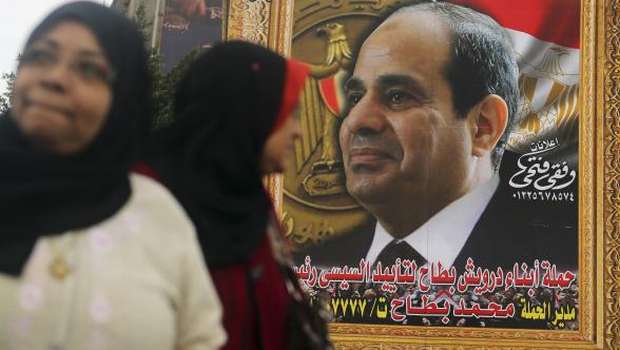
Women walk in front of a huge banner for Egypt’s army chief, Field Marshal Abdel Fattah El-Sisi in downtown Cairo, March 13, 2014. (Reuters/Amr Abdallah Dalsh)
Following a tour Asharq Al-Awsat made of other elections offices in Cairo and Giza, it becomes clear that scenes such as this are not exceptional; Egypt’s women may emerge as the key demographic determining the outcome of the upcoming presidential elections, scheduled for May 26–27.
Women played a prominent role during the 2011 uprising against Mubarak, as well as the polls—three constitutional referendums, parliamentary elections, and presidential elections—that have followed it. They were a noticeable presence also in the protests last year which led to former president Mohamed Mursi’s ouster. Most recently, there was much commentary regarding the female turnout during the 2014 constitutional referendum, seen as a vote of confidence for Egypt’s interim government and the political roadmap announced—by Sisi—following Mursi’s ouster. During a speech prior to the poll, Sisi called on Egyptians, and especially women, to make a visible presence during the February vote, and many Egyptian women seemed to oblige, with several polling stations witnessing a celebratory mood, largely thanks to female voters, who sang, danced and chanted as they waited to cast their votes.
Sisi became immensely popular after he played a central role in the army’s removal of former Islamist president Mohamed Mursi. Since then, he has earned a veritable litany of names and popular epithets declaring him Egypt’s “lion,” its “savior,” and even its new Nasser. For many, and after more than three years of the post-Mubarak “transitional period,” he seems the only rational choice for the role of president—a strong military man who will be able to rein in the seemingly never-ending spiral chaos the country has witnessed since 2011.
Speaking at the World Economic Forum in Davos in January, former interim prime minister Hazem El-Beblawi stirred controversy when he claimed it was the people and not the military who were pushing Sisi to run for the presidency—and “women in the first place”—before adding: “Don’t forget, he [Sisi] is a handsome man.” But Sisi’s own oratorical style perhaps also plays on this image; the former army chief uses a low-volume, almost soothing tone, regularly interspersed with emotionally-tinted comments proclaiming that he is “speaking from the heart,” or referring to the Egyptian people as “the light of my eyes.”
Now the window for nominations for the presidential race is open, potential candidates are required to submit their official nomination documents to the High Presidential Elections Committee—the body supervising the polls—along with a petition securing at least 25,000 signatures from Egyptians across the country.
In the elections office in Giza last week a large number of women—some Muslim, some Christian, and some wearing the full-face niqab veil—thronged the narrow, dimly-lit corridors, declaring their enthusiasm for Sisi and attempting to push their way through in order to give their signatures endorsing him for the campaign.
“Of course I support Sisi; are there any other candidates [to vote for]?” says Mary, a 55-year-old Christian woman.
Despite the festive atmosphere, there was also an undertone of suspicion at the elections office, with many of the women there alleging that the numerous power failures the office was experiencing were a deliberate attempt to undermine their efforts to sign Sisi’s petition. Some even refused to hand over their ID cards to officials, fearing their signature would be given to the other candidate.
Outside the elections office three young men from the pro-Sisi Mustaqbal Watan (Future of a Nation) campaign stood collecting signatures for their candidate. “We do not have any difficulties in collecting signatures,” Ahmed Al-Sayed, a member of the campaign, told Asharq Al-Awsat. He added that the only problem they faced were the suspicions of some of Sisi’s avid supporters at the station, who were ready to see saboteurs at every turn.
One lady lining up in front of the election office pointed to a bearded supporter of Sabahi; referring to the now-outlawed Muslim Brotherhood, she said: “There they are, at it again!”
Another woman, identifying herself only as Umm Ahmed, said that despite voting for Sabahi in the 2012 presidential elections, she would not be doing so again this time around. “I respect Sabahi but the country is in need of leadership and Sisi is capable of fixing the situation,” she said.
But despite his army of female fans, Sisi faces a huge array of problems to fix including those relating to Egypt’s women. Egypt is deemed the worst country for women’s rights in the Arab world according to a recent Thomson Reuters poll. According to a UN study, a stagerring 99 percent of women in Egypt have experienced some form of sexual harassment. As Sarah Abdel Rahim noted, writing in the Tahrir Institute for Middle East Policy: “Clearly, Sisi has charmed many of Egypt’s women, [but] is he the right candidate for them? Can Egyptian women entrust that the popularly revered military man will reform Egypt’s streets to be safer for them? More importantly, will he be able to deliver on his rhetoric and bring about policies that will address the gendered reality that negatively affects . . . 49.8% of the population . . . ?”
